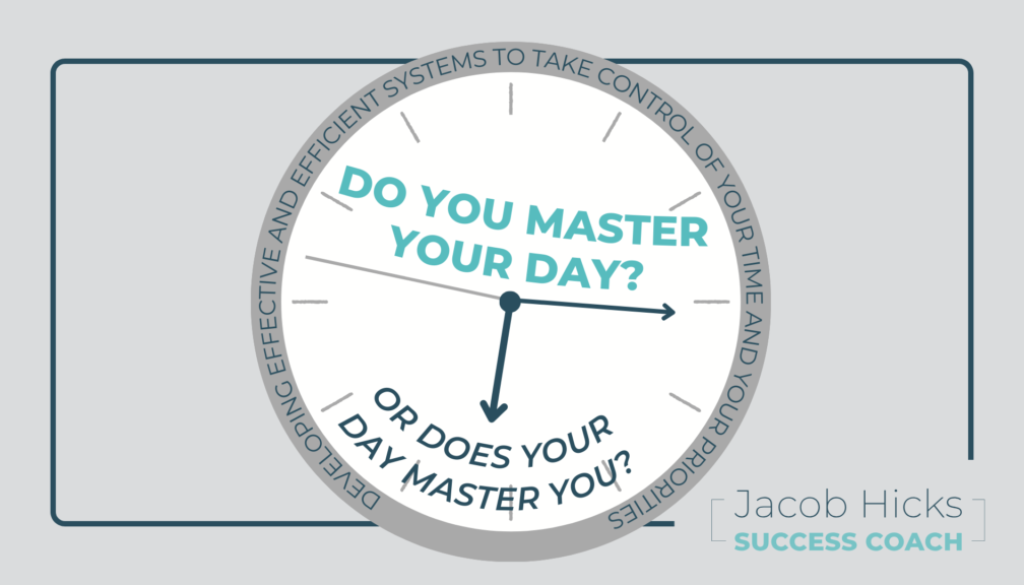DO YOU MASTER YOUR DAY, OR DOES YOUR DAY MASTER YOU?
Developing effective and efficient systems to take control of your time and your priorities
We are all working to be more successful, aren’t we? To be better husbands, wives, employees, bosses, and leaders.
Building effective systems can not only make your life easier by freeing you up to focus on what’s needed, but can also make you more effective by streamlining tasks, boosting productivity, and maintain consistency.
Today, we will explore why systems are important, how to create them, and offer a few examples of effective systems.
Why create systems?
Systems help you streamline tasks by providing a clear and organized path to completion. This reduces wasted time or energy so you can focus on what truly matters leading to accomplishing more, greater productivity, and avoiding missing something important.
How to create effective systems
1. Identify Your Goals or Priorities
It’s crucial to understand what you want to achieve or accomplish before creating any system. Clearly define your goal or priority in order to design a system that will support them.
2. Design Your System
Jot down all the necessary steps for what you are trying to accomplish. Include any necessary accountability or triggers that will cause you to move to the next step. Remember to start simple then add complexity as needed
3. Refine Your System
This is where the rubber meets the road. When you start to implement your system, you may quickly realize that you need to adjust your steps or how you approach them. Don’t be afraid to experiment or try new things to make your system work well for you.
Examples of effective systems for success
1. Productivity System
I love this one as it can apply to work and home. Tools like Trello, Asana, Monday, Microsoft teams, Todoist, or just a simple system on your smartphone notes can help organize tasks, deadlines, and collaboration. Including regular check-ins, tasks prioritization, and clear accountability can enhance your overall productivity.
2. Morning Routine System
Making sure your morning is productive can set the tone for the entire day. For example, your morning routine could include waking up at the same time every day, doing a quick workout, eating a healthy breakfast, planning the day. This can help you maintain focus and productivity throughout the day.
3. Financial Management System
This is one of my favorites as this can not only help make sure your finances don’t scatter out of control but can also help relieve anxiety about paying bills or having enough money. Tools like Mint, EveryDollar, You Need a Budget, or a basic spreadsheet can assist in tracking income and expenses, savings goals, or future planning. My personal system includes automatic transfers for all bills or savings to individuals accounts and a monthly evaluation to make sure I haven’t gotten off track.
Common challenges and how to kick them in the face
1. Resistance to Change
Sometimes creating a new system will cause us to get out of our routine. This can lead to great growth and success but can be challenging at times. To combat this, start small. Small enough that you have no problem continuing with the system the next time. Focus on the benefits of your system and keep the long-term goals in your line of sight.
2. Maintaining Consistency
Consistency will generally make or break our success. Create reminders, set specific times for your new routine, or bring in your best friend as an accountability partner. If you start slipping, revisit your goals, and adjust your systems for what you can manage consistently.
3. Adjusting and Improving Systems
Nothing is perfect, especially when we first start. Review your new system regularly and tweak it to improve your effectiveness. Be open to change and experiment with different approaches. Remember: there is no failure in experimentation, only learning.
Mastering your day isn’t just about ticking off tasks—it’s about creating a life where you are in the driver’s seat, steering towards your goals with intention and clarity.
By developing effective systems, you empower yourself to manage time, focus on what truly matters, and overcome obstacles with resilience.
Start small, stay consistent, and remain open to refining your approach. With the right systems in place, you’re not just working through your day—you’re mastering it.
Take the reins, kick those challenges in the face, and let your systems drive you toward the success you’ve always envisioned!
